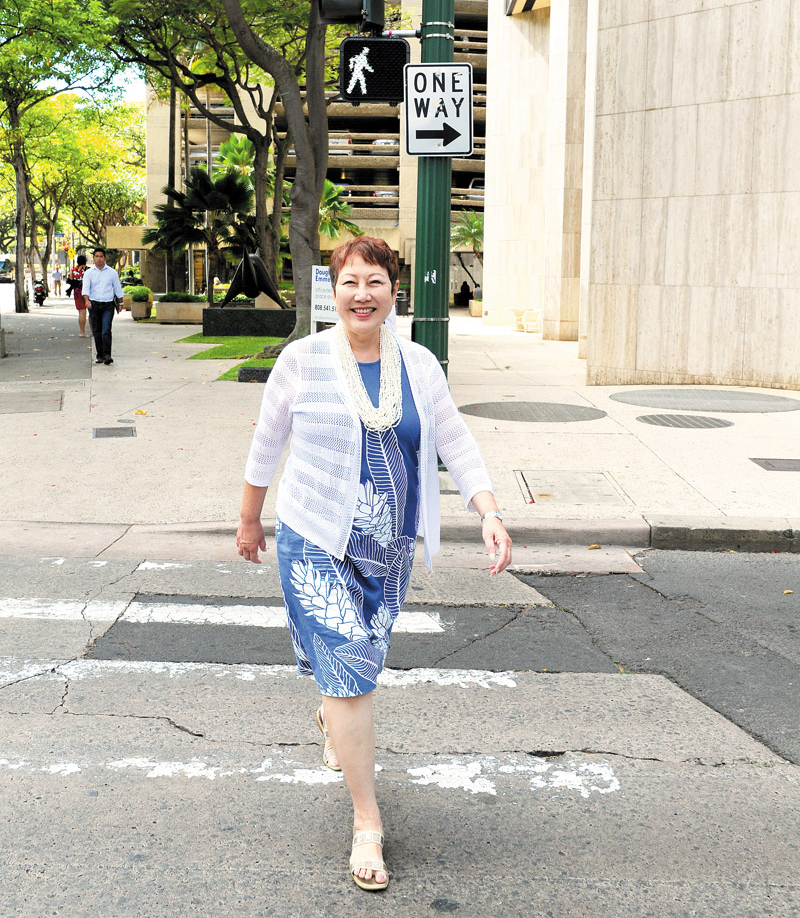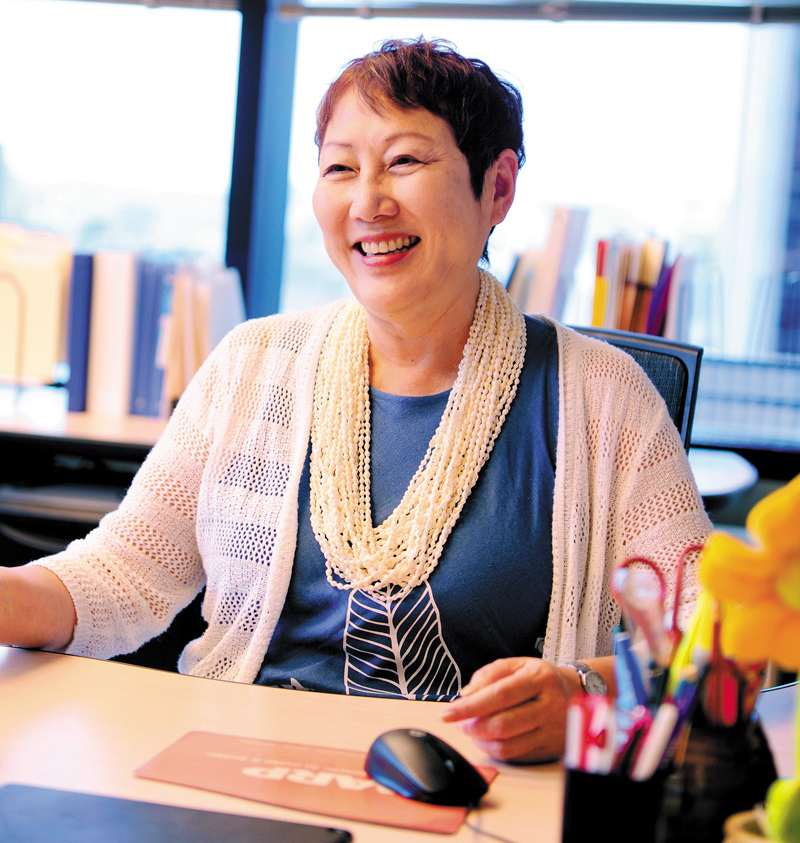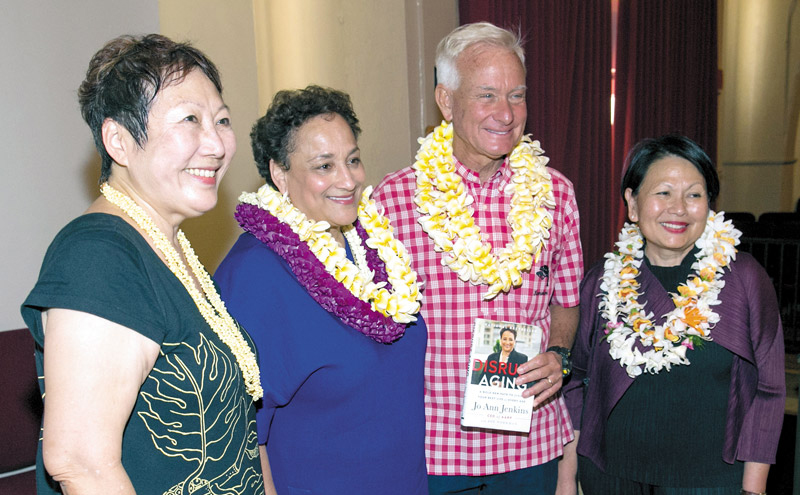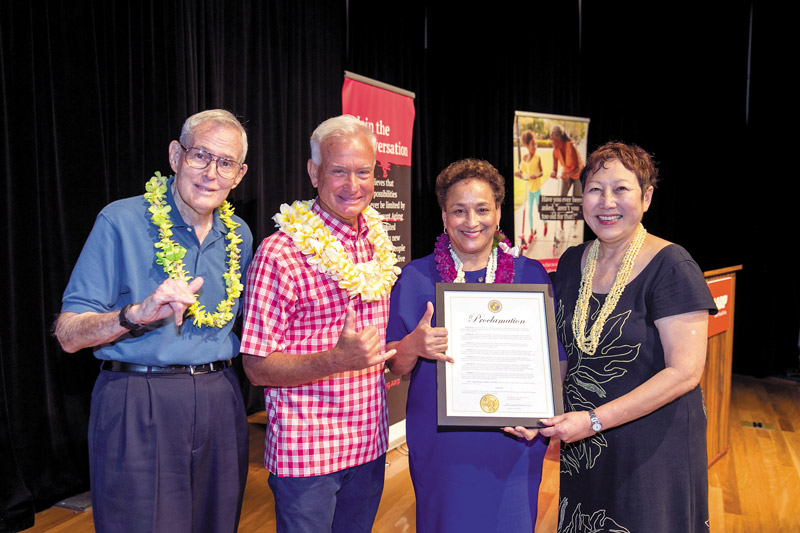Walking The Walk

Whether it’s improving pedestrian safety or fighting for health care reform, nobody has been more vocal for the Islands’ aging population and backed up her talk with quicker action, than Barbara Kim Stanton, state director of AARP Hawai‘i.
“As a society, we are obsessed with age. Everybody wants to live a long, good life, but no one wants to get old. – Jo Ann Jenkins, AARP CEO
According to Asian tradition, life begins again at age 60. If this is the case, why do many of us cower at the thought of aging? Just when we approach the best stage of life, one dims the light of vitality and shudders in fear of finality.
This psychological impasse evidently comes from society’s naiveté and negativity about the value of older citizens. Aging is said to be society’s excuse for laziness. It’s a way to opt out and give up.
AARP has had just about enough of age discrimination and the doomsday mentality. Founded in 1958 for persons age 50-plus, it is leading a movement to disrupt aging. The new-age AARP is cool, hip and edgy.
As its national CEO Jo Ann Jenkins, 58, puts it, “We don’t want to be defined by age any more than we would want to be defined by race, sex or income. We want people to be defined by who they are, not how old they are, and we refuse to allow the old expectations of what we should or should not do at a certain age define what we are going to do.”

As the state director of AARP Hawai‘i, Stanton remains the biggest supporter of the aged.
“So instead of just accepting and perpetuating the stereotypes or apologizing for our age — or denying it — let’s embrace our age and make the most of it,” she implores.
She points out that the two fastest-growing age groups are those over 85 and 100. By 2050, people over age 60 will outnumber children under 15 for the first time in history. A 10-year-old today has a 50 percent chance of living to be 104.
Age Disruptor
In Hawai‘i, we have a local champion who carries the banner of age disruption. It is Barbara Kim Stanton, 67, state director of AARP Hawai‘i. For the past 12 years, she has rallied the forces of public opinion and advocacy to speak up for the mature population of 50-plus whose numbers and impact in our community grow every year.
“We give voice to these consumers,” she says. “We make sure the individual’s voice on what they need to live their best life is heard by public officials, employers and community service providers.”

Stanton, left, and AARP CEO and Disrupt Aging author Jo Ann Jenkins met with Mayor Kirk Caldwell and wife Donna Tanoue before Jenkins’‘ keynote address at the Hawai‘i Book & Music Festival May 6.
PHOTO COURTESY AARP HAWAI‘I / MARCO GARCIA
With 40 years of public service experience, ranging from the legislature to top state departments, Stanton knows the power of speaking with a unified voice that represents a broad base of people and interests.
She knows her way around the State Capitol, City Hall and spheres of influence where public opinion and resources are leveraged.
“I grew up with parents who modeled compassion and helping others. I guess I was destined to follow,” she reflects.
The Kalihi native and Farrington High School graduate got started in community organizing as part of Gov. John Waihe‘e’s administration.
“He totally immersed me in grassroots community organizing to achieve ambitious public goals,” she says. “The lessons learned in those early days of my career carry over to my work at AARP to ensure that kūpuna are heard and their needs are met.”
Silver Tsunami
Social Security administration calls it the “silver tsunami,” noting that one-third of the workforce becomes eligible for retirement each year. Retiring employees take decades of knowledge, contacts and relationships with them.

AARP state volunteer president Gerry Silva (left), Mayor Kirk Caldwell, AARP CEO and Disrupt Aging author Jo Ann Jenkins and AARP state director Barbara Kim Stanton pose for a photo after the mayor issued a proclamation naming May 6 as AARP Day in Hawai‘i. PHOTO COURTESY AARP HAWAI‘I / MARCO GARCIA
Yet the days of mandatory retirement seem over. With increased longevity, more citizens are choosing to work beyond age 65 to stay productive and engaged in one’s community. This has social, economic and financial implications that AARP knows all too well as key issues.
Stanton cites AARP’s ongoing research that provides compelling insights into national trends as well as Hawai‘i-specific studies. (You can learn more about Hawai‘i’s AARP program at states.aarp.org/region/hawaii/).
“This is an important part of listening to members and target audiences to ensure that our programs are relevant and realistic,” she says.
Street Smarts
If AARP’s formal studies aren’t enough to validate real-life situations, Stanton has plenty of anecdotal accounts of islanders who candidly tell her about their aging plights.
From those have come strategic educational and advocacy programs for which AARP Hawai‘i is a proactive force.
Stanton is vocal on several current issues, including pedestrian safety, Honolulu’s Age Friendly Cities initiative, Kūpuna Care program, and health care reform.
Effective this month, Hawaii’s new CARE Act goes into effect, culminating a three-year struggle to get caregiver rights to be legally recognized and implemented.
Lawmakers unanimously passed HB 2252 — the Caregiver Advise, Record, Enable (CARE) Act — making Hawai‘i the 30th state since 2014 to give caregivers the opportunity to receive instructions when their loved ones are discharged from the hospital.
“This is a major win for family caregivers,” Stanton hails.
An estimated 154,000 caregivers in Hawai‘i provide increasingly complex care services —including injections, tube feedings and medication management — to older loved ones at home. Collectively, Hawai‘i’s care-givers provide unpaid care estimated at $2 billion a year.
The CARE Act requires Hawai‘i’s acute care hospitals to: one, provide the patient with the opportunity to designate a family caregiver on their medical record; two, notify you prior to the patient’s discharge or transfer to another facility; and three, offer you instructions on the medical tasks you will need to perform at home after the patient is discharged.
What’s in Your Wallet?
“We are offering wallet-sized cards with your rights under the CARE Act,” Stanton says. “That way, you’ll have important information about this new law available when you need it most.”
To get the free wallet card, go to action.aarp.org/careHI or call 1-877-333-5885.
As Hawai‘i’s population ages, the focus on long-term care, home safety, senior defensive driving and caregiver support are essential. Yet many communities, including ours, are woefully unprepared for the inevitable scenario.
“We need a well-defined plan,” Stanton asserts.
It also needs funding, just like every other community service and public-mandated project.
In some cases, as with the passage of the Kūpuna Care Act, there is seed money to set up the program, but no funding to sustain subsidies to caregivers.
“We not only work with seniors,” Stanton says. “We work with millennials to make them aware of ways to prepare for their retirement years. Our work-and-save initiative puts them on a good trajectory for financial savings.
“The best way to do this is through payroll savings,” she adds. “Our work with employers, the private sector and government agencies makes it a collaborative effort.
Top Concerns of Boomers, Seniors
1. Failing health
2. Inability to care for self
3. Losing mental abilities
4. Running out of money
5. Inability to get good health-care
6. Not being able to drive
7. Becoming a family burden
8. Ending up in a nursing home
9. Inability to work or volunteer
10. Being left alone and lonelySource: Asyouage.com
“It’s a matter of having pragmatic programs that address social change,” she asserts.
With far-reaching programs that aid Hawai‘i’s intergenerational populace, one would think AARP Hawai‘i has a staff of thousands to manage its multifaceted efforts.
The nonprofit, nonpartisan organization with 38 million members nationwide has five local full-time staffers, complemented by an army of dedicated volunteers.
“It’s a very powerful voice for social change,” Stanton boasts. “It is community mobilization at it best.”
Want more evidence of AARP as a change agent in our community?
The next time you cross the street with the aid of a pedestrian countdown light, thank AARP and the city administration.
According to Stanton, Hawai‘i has the highest per capita pedestrian death rate of any state for people 65 and older. AARP worked with the city to make Honolulu streets safer, including pushing for countdown timers on walk/ don’t walk signs.
It’s proof that Stanton walks the walk and talks the talk in the name of elder advocacy.
If that labels her an “age disruptor,” she’s fine with that. AARP is dedicated to facilitating citizens’ rights to live their best lives during retirement years.
As baseball legend Satchel Paige once said, “Age is a question of mind over matter. If you don’t mind, it doesn’t matter.”






